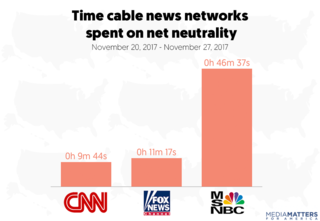@bladeofcreation:
Pai said. “On a party-line vote, it imposed heavy-handed, utility-style regulations upon the Internet. That decision was a mistake. It’s depressed investment in building and expanding broadband networks and deterred innovation.”
Here's an article from ArsTechnica about the investments of ISP's after Title 2 regulation (Net Neutrality). It features a nice table of the capital expenditures of the publicly traded ISP's.
Highlights:
"We found that not a single publicly traded US ISP ever told its investors (or the SEC) that Title II negatively impacted its own investments specifically," pro-net neutrality advocacy group Free Press said in a report issued yesterday.
The Free Press report disputes the investment numbers cited by Pai, saying that its own analysis shows an increase in network investment spending since the 2015 Title II net neutrality order. It isn't surprising that people on opposite sides of the issue would come to different conclusions on investment data. What can't be disputed is the fact that ISPs have given a rosy picture to investors, and the Free Press report provides examples of ISPs affirming that Title II hasn't hurt them:
- In December 2015, AT&T’s CEO told investors that the company would “deploy more fiber” in 2016 than it did in 2015 and that Title II would not impede its future business plans.
- In December 2016, Comcast’s chief financial officer admitted to investors that any concerns it had about reclassification were based only on “the fear of what Title II could have meant, more than what it actually meant.”
- That same month, Charter’s CEO told investors, “Title II, it didn’t really hurt us; it hasn’t hurt us.”
- Just a few days after the election, Cablevision and Suddenlink’s parent company Altice reaffirmed its plan to deploy FTTH [fiber-to-the-home] service to all of its customers and told investors that it remained “focused on upgrading our broadband networks to drive increases in broadband speeds and better customer experience.
Despite increasing its own capital investment by 10.2 percent in Q1 2017, Comcast claimed in a blog post last month that the FCC's treatment of broadband providers "harms investment and innovation."
Comcast spent $7.6 billion on its cable segment capital expenditures during 2016, the most the company has ever invested in a single year.
Charter Communications is yet another example of an ISP that dramatically increased its network investments during the two years following the FCC’s Open Internet Order vote... From 2015–2016 Charter’s pro forma capital investments [including newly acquired Time Warner Cable and Bright House Networks] topped $14.5 billion, a 15 percent increase which came despite hundreds of millions of dollars (or more) in synergies that Charter claimed following the May 2016 closing of the deal.
Verizon’s capital investment total increased during the year following the FCC’s adoption of the Open Internet Order (just as the company said it would a month before the February 2015 vote). And Verizon’s total two-year post-vote capital expenditures were 3.1 percent higher than they were in the two years preceding the vote, even as the company divested its Florida, Texas, and California systems to Frontier Communications.
There's also an explanation for why Pai's numbers show a negative impact to investments.
These numbers are provided by Investment data cited by Pai comes from the USTelecom broadband industry lobby group, the conservative Free State Foundation, and economist Hal Singer, who found a 5.6 percent decline in capital expenditures by 12 big ISPs.
Free Press notes that USTelecom and Singer excluded the money Sprint used on a "new strategy of purchasing smartphones and then leasing them to its customers," even though "purchasing equipment to lease" is a real capital expense, recognized under Generally Accepted Accounting Principles ('GAAP')."
"Sprint risked billions of dollars to purchase and then lease handsets. That is a key part of its broadband business strategy, and no different than a cable ISP’s purchasing and leasing of modems," Free Press wrote.
Singer argues that "it is important to ignore Sprint’s capitalization of handsets, an accounting change that occurred in the middle of the experiment," and notes that Sprint itself "breaks out these 'investments' separately from network investment." Singer also argues that AT&T's investment numbers have declined by an unexpected amount, especially when you exclude the company's investments in DirecTV and some Mexican cellular properties.
But AT&T predicted its own spending decline years before the FCC considered the use of Title II to enforce net neutrality rules. In November 2012, AT&T said it would increase capital expenditures in wireless and wireline for three years and return to the previous, lower investment levels starting in 2015. By February 2015, AT&T told investors that it had "substantially completed" the project.
TLDR: Pai's claim that Net neutrality has depressed investment in building and expanding broadband networks and deterred innovation is false.
No publicly traded ISP's have decreased investments due to net neutrality regulations since the rules were implemented two years ago. They told their investors that net neutrality hasn't impacted them negatively. AT&T did decrease their investment-level for 3 years starting in 2015, but announced this plan in 2012 before the FCC even considered enforcing title 2 regulations. These were first recommended by Obama in November 2014, published by the FCC on April 13 , 2015 and went into effect on June 12, 2015.
Despite AT&T's 0.6% decrease in capital expenditure (Which is very significant since AT&T accounts for nearly a third of the total ISP industry’s investments) , the publicly traded ISPs combined have increased their investments with 5,2% since title 2 regulations were in effect.


Log in to comment